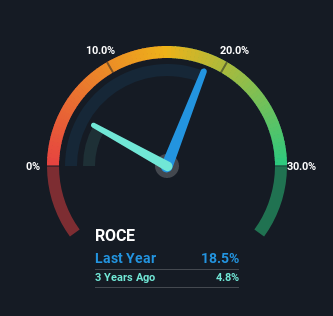- India
- /
- Hospitality
- /
- NSEI:DEVYANI
Devyani International (NSE:DEVYANI) Is Looking To Continue Growing Its Returns On Capital
If you're looking for a multi-bagger, there's a few things to keep an eye out for. Ideally, a business will show two trends; firstly a growing return on capital employed (ROCE) and secondly, an increasing amount of capital employed. Ultimately, this demonstrates that it's a business that is reinvesting profits at increasing rates of return. Speaking of which, we noticed some great changes in Devyani International's (NSE:DEVYANI) returns on capital, so let's have a look.
Understanding Return On Capital Employed (ROCE)
For those that aren't sure what ROCE is, it measures the amount of pre-tax profits a company can generate from the capital employed in its business. To calculate this metric for Devyani International, this is the formula:
Return on Capital Employed = Earnings Before Interest and Tax (EBIT) ÷ (Total Assets - Current Liabilities)
0.19 = ₹3.8b ÷ (₹26b - ₹5.3b) (Based on the trailing twelve months to December 2022).
Therefore, Devyani International has an ROCE of 19%. In absolute terms, that's a satisfactory return, but compared to the Hospitality industry average of 9.7% it's much better.
See our latest analysis for Devyani International

In the above chart we have measured Devyani International's prior ROCE against its prior performance, but the future is arguably more important. If you're interested, you can view the analysts predictions in our free report on analyst forecasts for the company.
What Can We Tell From Devyani International's ROCE Trend?
We like the trends that we're seeing from Devyani International. Over the last five years, returns on capital employed have risen substantially to 19%. The amount of capital employed has increased too, by 450%. The increasing returns on a growing amount of capital is common amongst multi-baggers and that's why we're impressed.
One more thing to note, Devyani International has decreased current liabilities to 20% of total assets over this period, which effectively reduces the amount of funding from suppliers or short-term creditors. So shareholders would be pleased that the growth in returns has mostly come from underlying business performance.
What We Can Learn From Devyani International's ROCE
In summary, it's great to see that Devyani International can compound returns by consistently reinvesting capital at increasing rates of return, because these are some of the key ingredients of those highly sought after multi-baggers. Astute investors may have an opportunity here because the stock has declined 19% in the last year. That being the case, research into the company's current valuation metrics and future prospects seems fitting.
One more thing, we've spotted 1 warning sign facing Devyani International that you might find interesting.
If you want to search for solid companies with great earnings, check out this free list of companies with good balance sheets and impressive returns on equity.
New: Manage All Your Stock Portfolios in One Place
We've created the ultimate portfolio companion for stock investors, and it's free.
• Connect an unlimited number of Portfolios and see your total in one currency
• Be alerted to new Warning Signs or Risks via email or mobile
• Track the Fair Value of your stocks
Have feedback on this article? Concerned about the content? Get in touch with us directly. Alternatively, email editorial-team (at) simplywallst.com.
This article by Simply Wall St is general in nature. We provide commentary based on historical data and analyst forecasts only using an unbiased methodology and our articles are not intended to be financial advice. It does not constitute a recommendation to buy or sell any stock, and does not take account of your objectives, or your financial situation. We aim to bring you long-term focused analysis driven by fundamental data. Note that our analysis may not factor in the latest price-sensitive company announcements or qualitative material. Simply Wall St has no position in any stocks mentioned.
About NSEI:DEVYANI
Devyani International
Develops, manages, and operates quick service restaurants and food courts in India, Nepal, Nigeria, Thailand, and internationally.
Good value with reasonable growth potential.
Similar Companies
Market Insights
Community Narratives


Recently Updated Narratives

Proximus: The State-Backed Backup Plan with 7% Gross Yield and 15% Currency Upside.

CEO: We are winners in the long term in the AI world

Early mover in a fast growing industry. Likely to experience share price volatility as they scale
Popular Narratives


MicroVision will explode future revenue by 380.37% with a vision towards success


The company that turned a verb into a global necessity and basically runs the modern internet, digital ads, smartphones, maps, and AI.



